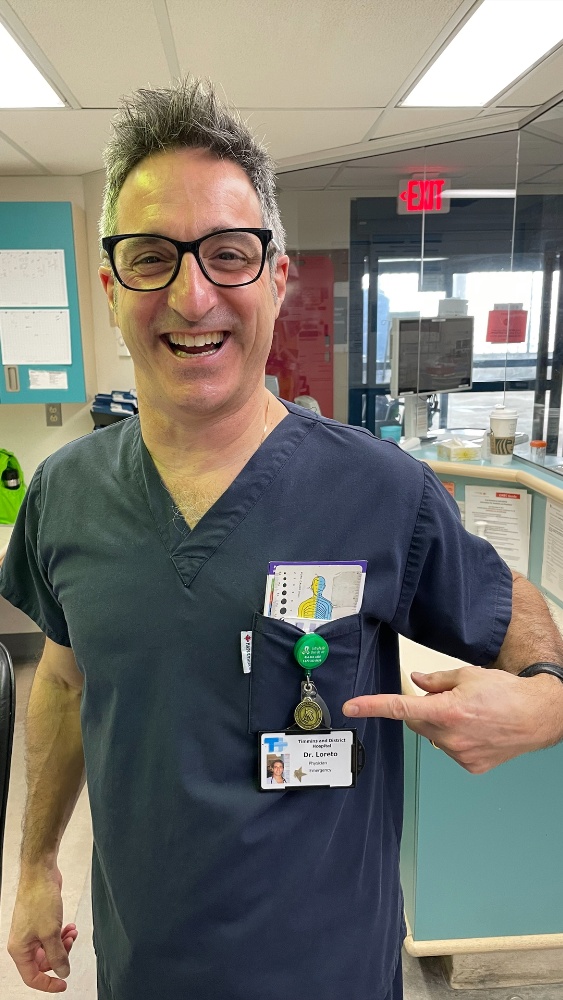Timmins, ON – February is Heart Month, a time to think about your heart and how to take better care of it to reduce your risk of heart attacks and cardiovascular disease – the second leading cause of death in our country.
Timmins and District Hospital Emergency room physician Dr. Chris Loreto credits an experience with a patient with helping him finally face what was happening with his own heart. It turns out both were experiencing a heart attack last November at the Timmins and District Hospital (TADH).
After being treated in Timmins, Dr. Loreto and his patient were both transferred to Health Sciences North in Sudbury, the cardiac referral centre for the region, where they ended up across the hall from each other. That’s where the wife of his patient came to visit him.
“She said: ‘Thank you for saving my husband’s life,’” remembers Dr. Loreto. “I said: ‘No, thank-you for saving my life.’”
The build-up to this moment started four-and-a-half months prior when Dr. Loreto had begun experiencing chest pain, a burning fire going up his throat and into his teeth and ears when he was out for a run. He would scream, often in front of the same house, to work through the pain.
Dr. Loreto had reached out to his family doctor, explaining that he believed he had acid reflux (leaving out the part where the pain was hitting him during exercise). But as summer turned to fall, the medications weren’t helping at all.
On the night of November 12th while playing hockey, the pain came but this time it stayed, lingering in his shoulders. Shrugging it off, he went to work the next morning. Near the end of his shift, a patient had a massive heart attack which Dr. Loreto jumped in to help with. Afterwards, he spoke to the patient’s wife to learn more about his symptoms leading up to this event. Both he and the patient were on the same medication for acid reflux.
“His story was my story,” Dr. Loreto said.
At that moment he turned to his colleagues, sharing some of his symptoms. After some choice words involving the word “stupid,” they convinced him to let them run some tests – bloodwork and EKG – which confirmed he was having a heart attack.
His denial of the seriousness of his situation extended to asking his colleagues to leave him on the roster for that weekend, which they ignored. Now three months later, Dr. Loreto is still off on medical leave. He’s started cardiac rehab after being transferred from Sudbury to St. Michael’s Hospital in Toronto for more procedures that involved drilling into his arteries to add stents.
His dad, also a runner, had a heart attack at 59. Dr. Loreto is one year older.
“That’s the power of genetics,” he said.
His active lifestyle, with running and hockey, has helped to strengthen his heart. In reflection, Dr Loreto admits that he should have gone to his family doctor last summer, when the pain continued to persist during exercise.
Like many people dedicated to caring for others, Dr. Loreto who has worked at TADH for three decades and has been head of the emergency department, is not great at taking his own health needs seriously.
“We’re wonderful at taking care of others and stink at taking care of ourselves,” he said.
Working as a doctor there is always something more important that needs to be done to help a patient, he explained. There’s a feeling of being irreplaceable and, also, bullet proof. Now, forced to slow down, he’s spent some time rethinking this mindset.
Dr. Loreto, urges patients to “do what I say, and not what I do.” If symptoms are continuing, take them seriously.
For now, Dr. Loreto is focusing on regaining his health through cardiac rehab sessions in Timmins.
Heart Disease Quick Facts:
- HeartandStroke.ca offers many resources.
- Symptoms of a heart attack can include: chest discomfort (pressure, squeezing, fullness or pain, burning or heaviness) upper body discomfort (neck jaw, shoulder, arms, back), shortness of breath, sweating, nausea, and light headedness.
- Women can experience a heart attack without chest pressure. They may experience shortness of breath, pressure or pain in the lower chest or upper abdomen, dizziness, lightheadedness or fainting, upper back pressure or extreme fatigue.
- Prevent by knowing your risk: Nine in ten Canadians have at least one risk factor. Almost 80% of premature heart disease and stroke can be prevented through healthy behaviours. That means that habits like eating healthy, being active, reducing stress, and living smoke free, have a big impact on your health.
- There are also risk factors you can’t control such as age, sex, family history, personal circumstances and heritage.
Our commitment: TADH operates within the traditional lands of the Mattagami First Nation, located in Treaty 9 territory. Our team is committed to building strong, lasting relationships with Indigenous communities as we acknowledge the diversity, history and heritage of Indigenous Peoples in the North.
Photo Caption: Dr. Chris Loreto
For more information contact TADH’s Communications Team: 705-267-2131 Ext. 2409 or communications@tadh.com
